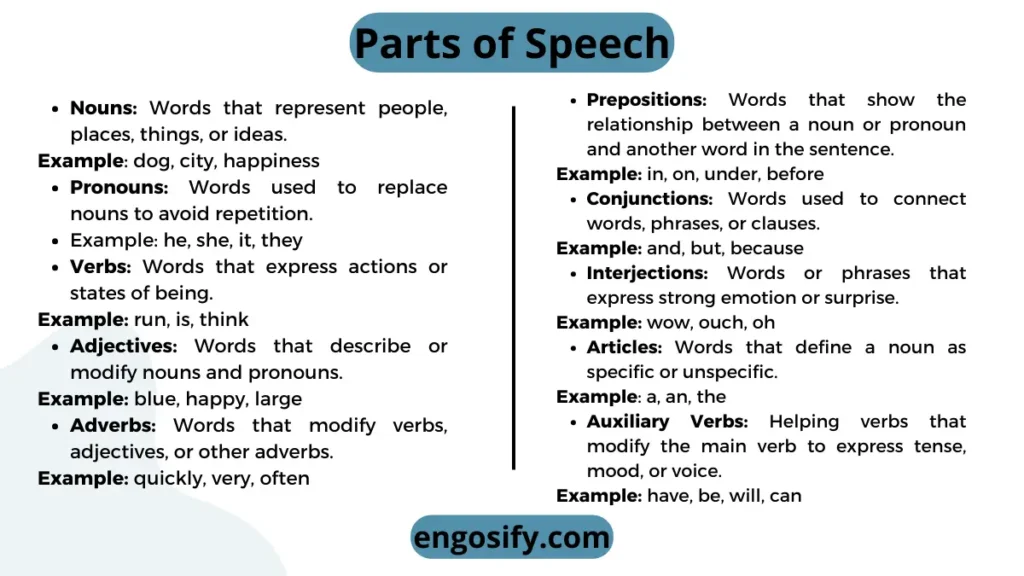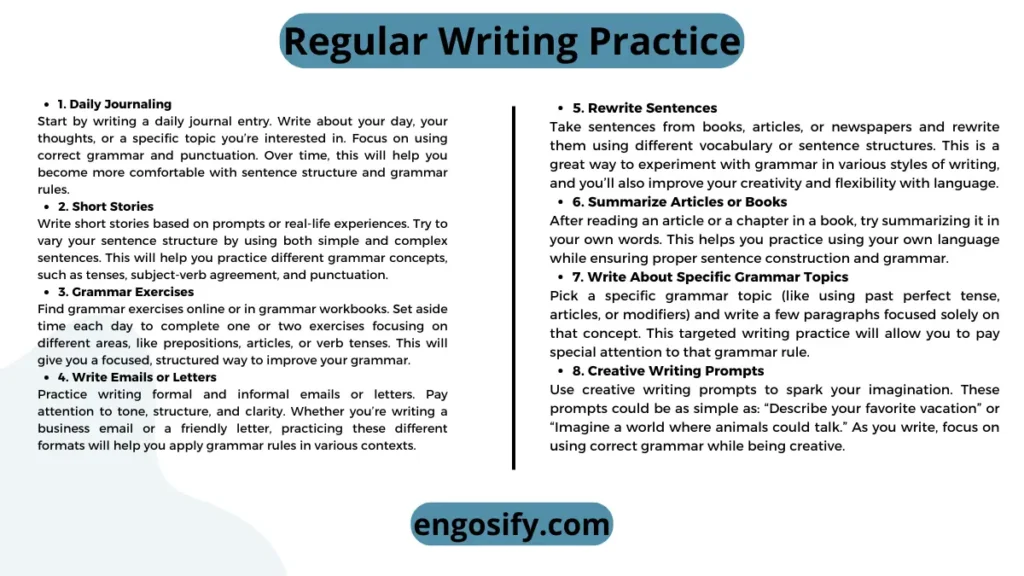Improving your English grammar isn’t just about memorizing rules—it’s about transforming the way you communicate, both in writing and speaking. Whether you’re trying to ace an exam, improve your professional communication, or simply become more confident in day-to-day conversations, mastering grammar is essential.
This article will guide you through the core elements of English grammar, highlighting the most common mistakes, offering tips for improvement, and providing you with resources to take your skills to the next level.
Introduction to English Grammar
What Is English Grammar?
In its simplest form, English grammar refers to the set of rules that govern how we use words in sentences. These rules help us understand the structure of a language, ensuring that our communication is clear, accurate, and effective. Grammar governs everything from word order and punctuation to verb tenses and sentence structure. Without grammar, sentences would be nothing more than a jumbled collection of words, making it hard for the listener or reader to understand the intended meaning.
Why Grammar Matters
Now, you might wonder, why does grammar matter so much? Well, it’s more than just about sounding “proper.” Good grammar ensures that you express your thoughts clearly. It enables you to communicate precisely, avoiding confusion. Whether you’re writing an email or speaking with friends, strong grammar skills can make all the difference in how you’re understood.
Think about it: incorrect grammar can unintentionally change the meaning of a sentence. For example, “Let’s eat, Grandma!” vs. “Let’s eat Grandma!” The first sentence is inviting Grandma to join you for a meal, while the second… well, let’s just say it’s a bit more concerning.
Additionally, grammar reflects your level of education and attention to detail, which can influence how others perceive you—especially in professional or academic settings. That’s why taking the time to improve your grammar can boost your confidence and effectiveness, whether in writing or speaking.
Ready to get started? In the next part, we’ll dive into the essential building blocks of English grammar that form the foundation for everything else.
Core Components of English Grammar
Parts of Speech
When you first start learning English grammar, it’s essential to get a grip on the parts of speech. These are the building blocks of sentences. Understanding how each part functions will not only make your writing more cohesive but also help you speak more confidently.
Here are the main parts of speech you’ll encounter:
- Nouns: These are words that name people, places, things, or ideas. For example, dog, city, and happiness.
- Pronouns: Words that replace nouns to avoid repetition. For instance, instead of saying “The dog chased the dog,” you’d say, “The dog chased it.”
- Verbs: Verbs show action or state of being. They’re the heart of any sentence. For example, “She runs every morning” or “They are happy.”
- Adjectives: These words describe nouns or pronouns. They help paint a picture. Think of “The blue sky” or “A beautiful painting.”
- Adverbs: Adverbs modify verbs, adjectives, or other adverbs. They often end in “-ly.” For example, “He runs quickly” or “She is extremely talented.”
- Prepositions: These words show relationships between other words in a sentence. Examples include “on,” “under,” and “beside.”
- Conjunctions: Conjunctions join words, phrases, or clauses. Common examples include and, but, and because.
- Interjections: These are short, emotional words that stand alone. Words like wow, oops, and oh are examples.

By mastering these parts of speech, you’ll have a strong foundation for creating grammatically sound sentences.
Sentence Structure
Once you understand the parts of speech, the next step is learning how to arrange them into sentences. This is where sentence structure comes into play. English sentences generally follow a subject-verb-object pattern. For example, in “I (subject) eat (verb) pizza (object),” you see this basic structure.
However, you can mix things up with different types of sentences:
- Simple sentences: These consist of just one independent clause. For example, “She dances.”
- Compound sentences: These combine two independent clauses using conjunctions like and or but. “She dances, and he sings.”
- Complex sentences: These include both independent and dependent clauses. “She dances because she loves music.”
- Compound-complex sentences: These combine compound and complex sentences. “She dances, and he sings because they enjoy performing.”
Getting familiar with these sentence structures will help you avoid awkward phrasing and enhance the clarity of your writing and speech.
Tenses and Their Usage
English grammar wouldn’t be complete without discussing tenses. Tenses indicate when an action occurs: in the past, present, or future. Understanding tenses ensures that you’re expressing actions or states at the correct time.
- Present tense: Describes actions happening now or regularly. “She eats lunch at noon.”
- Past tense: Describes actions that have already happened. “He ate lunch earlier.”
- Future tense: Describes actions that will happen. “They will eat lunch tomorrow.”
You’ll also find variations like present perfect, past perfect, and others, but don’t worry! Once you get the hang of these basic tenses, you’ll be able to tackle the more complex ones with ease.
Common Grammar Mistakes and How to Avoid Them
Misplaced Modifiers
One of the trickiest mistakes in English grammar is a misplaced modifier. This happens when a word, phrase, or clause is placed incorrectly in a sentence, causing confusion or a humorous (yet unintended) meaning. Let’s take a look at an example:
- Incorrect: “She almost drove the car for three hours.”
- Correct: “She drove the car for almost three hours.”
In the incorrect sentence, the placement of “almost” makes it sound like she almost drove the car for three hours, rather than driving the car for that amount of time. Properly placing modifiers ensures your meaning is clear.
To avoid this, always ensure that the modifier is placed next to the word it’s modifying. This simple trick will help you avoid awkward or confusing sentences.
Subject-Verb Agreement
Another common error that often pops up in everyday conversations and written content is subject-verb agreement. This happens when the subject and verb in a sentence don’t match in number. Here’s an example of what NOT to do:
- Incorrect: “The team are playing well.”
- Correct: “The team is playing well.”
The issue here lies in the subject “team,” which is singular, but the verb “are” is plural. In English, collective nouns like team or family are treated as singular, so you should use “is” instead of “are.”
Here’s another example:
- Incorrect: “The dogs runs in the park.”
- Correct: “The dogs run in the park.”
To avoid making this mistake, make sure your subject and verb match in number. This applies not only to singular and plural subjects but also when you’re working with more complex sentence structures. When in doubt, check if your subject is singular or plural, and ensure your verb agrees with it.
Confusing Words
There are many words in English that are commonly confused due to similar spelling or pronunciation. Here are a few examples:
- Their vs. They’re vs. There
- Their is possessive, e.g., “Their house is big.”
- They’re is a contraction of “they are,” e.g., “They’re going to the store.”
- There refers to a place, e.g., “She is over there.”
- Affect vs. Effect
- Affect is usually a verb, meaning “to influence,” e.g., “The news affected him deeply.”
- Effect is a noun, meaning “a result,” e.g., “The effect of the storm was devastating.”
To avoid confusing these words, pay attention to their meanings and usage. A simple trick is to remember that affect is an action (a verb), while effect is the result (a noun).
Improving Written English Grammar
Regular Writing Practice
One of the most effective ways to improve your written English grammar is through regular writing practice. Just like any other skill, the more you practice, the better you get. Whether you’re writing journals, essays, or stories, consistently putting pen to paper (or fingers to keyboard) helps reinforce the grammar rules you’ve learned.
For example, if you struggle with subject-verb agreement, you can focus on writing sentences that emphasize subject-verb matching. Or, if you have trouble with tenses, you can challenge yourself to write a short paragraph in the present tense, then rewrite it in the past and future tenses.
Remember, the key is consistency. Set aside time each day or week to write. Over time, you’ll notice that your grammar improves naturally, and you’ll begin to internalize those rules.

Reading to Enhance Grammar
Another tip for improving your grammar is to read regularly. Reading in English exposes you to correct grammar usage in context, helping you absorb language patterns and sentence structures. The more you read, the more you’ll get a feel for how different grammar rules work.
When reading, try to focus not just on the content but also on how the sentences are constructed. Notice the verb tenses, punctuation, and sentence variety. By doing this, you’ll get a stronger sense of proper grammar without even realizing it. Plus, reading books, articles, or blogs in English will expand your vocabulary, helping you choose the right words and phrases when writing.
To get the most out of this, diversify your reading materials. Pick up novels, newspapers, and websites that use both formal and informal language. You’ll get a well-rounded understanding of English grammar, from creative storytelling to business communication.
If you’re not sure where to start, try reading news articles or blog posts on topics you’re passionate about. These are often written in clear, conversational English that can improve your grammar skills.
Utilizing Grammar Tools
In today’s digital age, there are a variety of online tools designed to help you catch grammar mistakes and improve your writing. Tools like Grammarly and Hemingway Editor can quickly point out errors in spelling, punctuation, and even suggest improvements for sentence structure. These tools are a great way to get immediate feedback while you’re writing.
While grammar tools are incredibly useful, don’t rely on them exclusively. Use them as a learning tool—not just a crutch. Review the suggestions made by these tools, understand why the correction was necessary, and apply the lessons to your future writing.
In addition to these tools, many word processors, such as Microsoft Word or Google Docs, have built-in grammar checkers. Be sure to turn these on so that you can catch errors while you write.
Enhancing Spoken English Grammar
Daily Conversation Practice
Improving your spoken English grammar starts with regular conversation practice. The more you speak, the more naturally grammar will come to you. Whether you’re chatting with friends, engaging in discussions at work, or even talking to yourself (don’t worry, it works!), the key is to practice speaking in English daily.
It doesn’t have to be formal or academic—casual conversations are a great way to start. Focus on using correct grammar as you express your thoughts. For instance, pay attention to subject-verb agreement or word order while you speak. Over time, you’ll develop a more intuitive understanding of English grammar, and it will become second nature in your speech.
If you’re nervous about speaking, start small. You can practice with a language exchange partner or join online conversation groups where you can get feedback and learn in a comfortable environment. You can also use language-learning apps that connect you with native speakers, such as HelloTalk or Tandem.
Listening to Native Speakers
Another powerful way to improve your spoken grammar is by listening to native speakers. By exposing yourself to real-life conversations, you can pick up on natural sentence structures, intonation patterns, and the correct usage of tenses. Listening to English speakers in different contexts—whether in movies, podcasts, or news broadcasts—will give you a better sense of how grammar is used in various situations.
For instance, watching a news interview can teach you more formal grammar, while a movie might expose you to casual, everyday speech. Podcasts are especially useful because they often feature conversations that reflect real spoken English, giving you a chance to hear correct grammar usage in natural dialogues.
To make this even more effective, try listening and repeating. Pause the video or podcast and mimic what you hear. This exercise helps reinforce grammar rules and improves your fluency and pronunciation.
Recording and Reviewing Speech
An excellent way to assess your spoken grammar is to record yourself speaking. Whether it’s reading aloud from a book, narrating your day, or giving a short speech, listening to your recordings will help you catch errors that might slip past you in conversation.
This method allows you to reflect on your sentence structure, word choice, and grammar usage. Take note of any mistakes, and keep track of patterns you need to work on. As you continue to practice and review, your grammar will gradually improve.
Advanced Grammar Tips for Mastery
Understanding Complex Sentences
Once you’ve got the basics down, it’s time to tackle complex sentences. A complex sentence contains both an independent clause (a complete thought) and at least one dependent clause (an incomplete thought). Mastering this structure will not only make your writing more interesting but also more sophisticated.
For example:
- Simple Sentence: “She studied all night.”
- Complex Sentence: “She studied all night because she had an important exam.”

Notice how the complex sentence gives you more detail and depth. To master complex sentences, practice combining short, simple sentences with dependent clauses. Use conjunctions like although, because, if, and while to link your ideas.
This skill is especially important for writing essays or reports, where you need to express ideas clearly but in more nuanced ways.
Mastering Punctuation
Punctuation is often overlooked, but it plays a huge role in clarifying meaning. Misplacing a comma or failing to use a semicolon can change the entire tone or meaning of a sentence.
For example:
- Incorrect: “Let’s eat, Grandma!”
- Correct: “Let’s eat Grandma!”
To master punctuation, learn the rules for commas, semicolons, colons, and dashes. Once you understand these, you can create more readable and professional-looking text. Proper punctuation also helps you control pacing and emphasis in both writing and speech.
FAQ
1. How long does it take to improve my English grammar?
Improving your English grammar is a gradual process that depends on several factors, such as your starting point, how often you practice, and how dedicated you are to learning. For some, noticeable progress can be seen in a few months, while for others, it might take longer. The key is consistent practice—whether that’s through writing exercises, conversations, or using grammar tools. Over time, you’ll find that grammar becomes more intuitive.
2. What are the best resources to improve my English grammar?
There are many great resources available for improving your grammar, ranging from websites to books. Here are a few highly recommended options:
- Websites: Grammarly for automatic grammar checking, Purdue OWL for detailed grammar explanations, and BBC Learning English for grammar lessons and exercises.
- Books: “Practical English Usage” by Michael Swan and “English Grammar in Use” by Raymond Murphy are great choices for learners at all levels.
- Apps: Download apps like Duolingo, Babbel, or HelloTalk for interactive grammar practice.
Using a combination of these resources will provide you with a well-rounded approach to grammar improvement.
3. Can I improve my grammar without formal lessons?
Yes! While formal lessons can be helpful, you can significantly improve your grammar through self-study. Reading books, writing regularly, and listening to native speakers will give you real-world examples of how grammar is used correctly. Additionally, there are plenty of free online resources and interactive tools that guide you through common grammar rules. The key is to stay consistent and actively practice.
4. How can I stop making grammar mistakes when speaking?
To reduce grammar mistakes in speech, focus on practicing more slowly and deliberately. Don’t be afraid to pause and think about the sentence structure. Listening and imitating native speakers can also help you internalize grammar rules. Over time, you’ll speak more confidently and accurately without having to think too much about it.
Conclusion
Improving your English grammar is an ongoing journey that requires patience, consistency, and practice. From mastering the basics like parts of speech and sentence structure to diving into more advanced concepts like complex sentences and punctuation, every step you take will bring you closer to better communication. Whether you’re writing emails, participating in meetings, or having casual conversations, strong grammar enhances your clarity and confidence.
Remember, the key is regular practice. Make a habit of writing, speaking, listening, and reading in English to reinforce what you’ve learned. Don’t hesitate to use grammar tools, read widely, and engage in conversations to accelerate your progress. With time, you’ll notice not only an improvement in your grammar but also a boost in your overall language proficiency.
Keep challenging yourself, stay motivated, and enjoy the learning process. The more you immerse yourself in the language, the more naturally grammar will come to you. So, start today, and you’ll be amazed at how much you can accomplish!

